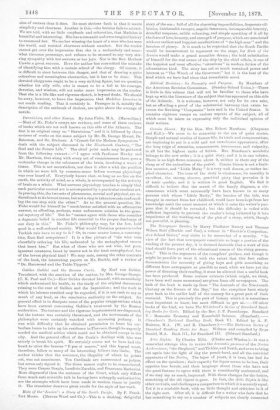The Newspaper Reader, by Harry Fiudlater Bussey and Thomas Wilson
Reid (Blackie and Son), a volume in " I3lackie's Comprehen- sive School Series," may claim to be somewhat of a novelty. "In view of the fact that newspapers constitute so large a portion of the reading of the present day, it is deemed desirable that a work of this kind should form part of the educational course of the rising genera- tion." This is the argument of the compilers' preface, and though it might be possible to moot it with the retort that this fact rather demonstrates the necessity of giving boys and girls something as different from newspapers as possible to read, while we have yet the power of directing their reading, it must be allowed that a useful book has boon produced. Some curious extracts (which might, we think, have been well more numerous) are given from old newspapers. The bulk of the book is made up from "The Journals of the Nineteenth Century on tho Events of the Day," but the compilers have wisely gone back to the earlier half of the century for a great part of their material. This is precisely the part of history which it is sometimes most important to know, but most difficult to get at.—Of other books of the kind, we have The Whiteland's Series of Standard Read- ing Books for Girls. Edited by the Rev. J. P. Faunthorpe. Standard V.: Domestic Economy and Household Science. (Stanford).— Chambers's National Reading Book, Book VI. Edited by A. F. Muirson, M.A. (W. and R. Chambers.)—The Battersea &ries of Standard Reading Books for Boys. Written and compiled by Evan Daniel, M.A. Book III., for Standard III. (Edward Stanford.)


































 Previous page
Previous page